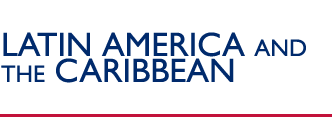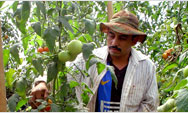
José Familia proudly shows off the peppers grown in his environmentally friendly greenhouse, built with help from USAID/DR’s Environmental Protection Investment Fund. This fund promotes positive impact on the environment and achieves financial sustainability of the recipient NGOs and CBOs. USAID contribution is 1 to 1. Under this fund USAID has financed 26 projects in eco-tourism, organic farming and renewable energy areas.
Photo: USAID / Maria De Moya
Dominican Republic Snapshot
Date of independence: 1844
Population: 9.3 million (2007)
Income per person: $ 2,850 (yr)
USAID in Dominican Republic
http://www.usaid.gov/dr/
|
USAID ASSISTANCE TO DOMINICAN REPUBLIC
($ In Millions)

|
CONTACT INFORMATION
Mission Director
Richard Goughnour
USAID Santo Domingo
Unit 3470, Box 0528
APO, AA 34041-0528
Tel: (809) 221-1100
E-mail: rgoughnour@usaid.gov
Desk Officer (Washington)
Patricia Alexander
Tel: 202-712-1731
E-mail: paalexander@usaid.gov
|
|
Overview
 The most recent World Bank Poverty Assessment reports 43% of the Dominican population living in poverty, of which 16% fall into the extreme poverty category. In addition, almost 30% of poor Dominicans lack official identity documentation which hinders their access to formal credit and basic public services such as schooling and health care. Other challenges to the country’s development include low levels (2.9 percent of GDP) of public expenditures allocated to education (44% less than the other countries in the region); high interest rates, frequent electrical blackouts, institutional rigidity and shortage of qualified human resources; high maternal mortality rate (178 deaths for every 100,000 live births); and a lack of accountability and limited citizen oversight of government expenditures. The most recent World Bank Poverty Assessment reports 43% of the Dominican population living in poverty, of which 16% fall into the extreme poverty category. In addition, almost 30% of poor Dominicans lack official identity documentation which hinders their access to formal credit and basic public services such as schooling and health care. Other challenges to the country’s development include low levels (2.9 percent of GDP) of public expenditures allocated to education (44% less than the other countries in the region); high interest rates, frequent electrical blackouts, institutional rigidity and shortage of qualified human resources; high maternal mortality rate (178 deaths for every 100,000 live births); and a lack of accountability and limited citizen oversight of government expenditures.
On March 1, 2007 the Central America-Dominican Republic Free Trade Agreement (DR-CAFTA) went into force for the DR. In order to fully benefit from the trade agreement, greater efficiency and transparency are needed in customs procedures, protection of intellectual property rights, the enforcement of environmental and labor standards, sanitary and phytosanitary regulations, fair trade practices and dispute resolutions, and in government procurement of goods and services. In addition, small businesses (including farms and tourism enterprises) will have to become more competitive to survive and expand in an open global economy. The growth of investment and small businesses are also critical to increasing employment and reducing poverty in the Dominican Republic.
USAID’s close partnership with the Dominican Republic has helped the country address many key challenges to its development including weak governance, inadequate rule of law, frail public institutions, and poor service delivery; the poor quality of public health care and basic education; environmental degradation; a growing gap between rich and poor; and the need to improve the business and investment climate and adjust to a rapidly changing global economy. The USAID program has also contributed significantly to mutual understanding between the United States and the Dominican Republic and to the geo-political stability of the Caribbean region.
Programs
Governing Justly and Democratically
USAID supports democracy and good governance in the Dominican Republic by improving electoral processes and strengthening the responsible participation of civil society in the political system. The program helps a better informed and active citizenry demand more from elected officials by increasing incentives for government officials to meet their obligations and by assisting the Dominican people to evaluate the performance of those elected. USAID assistance is also reinforcing the rule of law, helping to reform and modernize the justice system, and increasing access to equitable justice. A crucial component in support of more government transparency and accountability is USAID’s technical assistance to public sector institutions and civil society groups to combat corruption and promote fiscal integrity and responsibility.
Investing In People
USAID is working to improve the quality of life for Dominicans through support for widely accessible quality health care services and disease prevention. USAID assistance focuses on prevention, care and treatment of communicable diseases and on improvements in primary and health care services for underserved populations. More specifically, USAID supports increased access to and use of basic health care services for Sexually Transmitted Infections (STIs), Tuberculosis, and HIV/AIDS among vulnerable, infected and affected groups. USAID also helps underserved populations gain access to quality reproductive health, maternal and child health services provided by both the public and private sectors, and is working to increase the use of child survival interventions through improved access to quality immunization services. In addition, USAID is working to increase the efficiency and equity of basic health care services at the local level through systems strengthening and public health policy reform. USAID works to improve social and economic opportunities for the poor by enhancing teacher training for public primary school teachers of reading, writing, and mathematics, and by fostering active private sector and community participation in improving the quality of basic education in local public primary schools.
Economic Growth
USAID is contributing to the Dominican Republic’s ability to compete in global markets and to reduce poverty through increased economic opportunities for targeted populations. USAID is providing technical assistance in economic policy reform, trade capacity building, rural economic diversification and development, and regional competitiveness initiatives so that entrepreneurs in small businesses in rural communities can improve productivity and compete in global markets. A third component of USAID’s work is the safeguarding of biodiversity and natural ecosystems through strengthened capacity to develop and enforce national environmental and natural resources laws and regulations; increased public sector capacity at both the national and municipal levels to identify and implement activities that promote environmentally sustainable economic growth; and assistance to civil society groups that advocate for and contribute to a cleaner environment and greater biodiversity protection.
|


